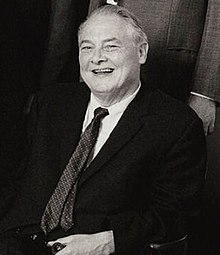| The Right HonourableThe Lord Francis-Williams CBE | |
|---|---|
 | |
| Downing Street Press Secretary | |
| In office 1945–1947 | |
| Prime Minister | Clement Attlee |
| Preceded by | Position established |
| Succeeded by | Philip Jordan |
| Personal details | |
| Born | Edward Francis Williams (1903-03-10)10 March 1903 St Martin's, Shropshire, England |
| Died | 5 June 1970(1970-06-05) (aged 67) |
| Education | Queen Elizabeth's Grammar School, Middleton |
Edward Francis Williams, Baron Francis-Williams CBE (10 March 1903 – 5 June 1970), known as Frank Williams, was a British newspaper editor, political advisor and author.
Early life
Born in St Martin's, Shropshire, Williams studied at Queen Elizabeth's Grammar School, Middleton, before entering journalism. He worked on the Bootle Times and then the Liverpool Courier, and was convinced of socialism by the conditions he saw. He moved to London to take up a post as a financial journalist on the Evening Standard, but soon moved to the Daily Herald, a paper with views closer to his own.
Breakout
Editor of the Daily Herald
In 1936, he accepted the editorship of the Daily Herald, serving until 1940.
Political involvement
In 1941, he became Controller of Press Censorship and News at the Ministry of Information, and for his work he was appointed a Commander of the Order of the British Empire (CBE) in 1945. He then became the public relations advisor to Labour Party Prime Minister Clement Attlee for two years, the first person to hold such a position. From 1951 to 1952, he was a governor of the BBC. On 13 April 1962 he was created a life peer as Baron Francis-Williams, of Abinger in the County of Surrey.
Academia
Professorship
Williams served as Regents' Professor at the University of California, Berkeley, in 1961, and Kemper Knapp Visiting Professor at the University of Wisconsin from 1967 until his death.
Books
He wrote several books, including a biography of Ernest Bevin, and he co-authored Clement Attlee's autobiography. His The Triple Challenge: The Future of Socialist Britain (1948) explains the main Labour programs started under Attlee. or the UNESCO, he wrote Transmitting World News (1953). In 1957, Francis produced a history of the press, entitled Dangerous Estate, part of which was devoted to explaining the rise and fall in the circulation of newspapers.
External links
References
- "Current Reading", News and Courier, 20 December 1970
- ^ Dod's Parliamentary Companion, Vol.134, p.104
- Max Laidlaw, "A Prairie Bookshelf", Leader-Post, 29 August 1970
- "No. 36866". The London Gazette (Supplement). 1 January 1945. p. 27.
- Fielding, Steven. “‘Don’t Know and Don’t Care’: Popular Political Attitudes in Labour’s Britain, 1945-51.” In The Attlee Years, edited by Nick Tiratsoo. London: Continuum International Publishing, 1991, p. 115
- "No. 42651". The London Gazette. 17 April 1962. p. 3185.
- Chris Cook et al, The Longman guide to sources in contemporary British history: Volume 2, p.132
- Dod's Parliamentary Companion, Vol.137, p.108
- Angell, Sir Norman (15 March 1957). "Press Review". Times Literary Supplement. p. 162.
| Media offices | ||
|---|---|---|
| Preceded byW. H. Stevenson | Editor of the Daily Herald 1936–1940 |
Succeeded byPercy Cudlipp |
| Government offices | ||
| Preceded byOffice established | Downing Street Press Secretary 1945-1947 |
Succeeded byPhilip Jordan |
| Downing Street press secretaries | ||
|---|---|---|
| Clement Attlee |
|  |
| Winston Churchill |
| |
| Anthony Eden |
| |
| Harold Macmillan |
| |
| Alec Douglas-Home |
| |
| Harold Wilson |
| |
| Edward Heath |
| |
| Harold Wilson |
| |
| James Callaghan |
| |
| Margaret Thatcher |
| |
| John Major |
| |
| Tony Blair |
| |
| Gordon Brown |
| |
| David Cameron |
| |
| Theresa May |
| |
| Boris Johnson |
| |
| Liz Truss |
| |
| Rishi Sunak |
| |
| Keir Starmer |
| |